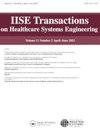使用电子健康记录的医生之间的健康信息交换:从社会技术角度的促进因素和障碍
IF 1.5
Q3 HEALTH CARE SCIENCES & SERVICES
IISE Transactions on Healthcare Systems Engineering
Pub Date : 2023-02-08
DOI:10.1080/24725579.2023.2177780
引用次数: 1
摘要
本文章由计算机程序翻译,如有差异,请以英文原文为准。
Exchange of health information among doctors using Electronic Health Records: Facilitators & Barriers from a socio-technical perspective
Abstract Electronic health records (EHRs) and other computerized systems facilitate the timely exchange of patients’ health information between providers across different departments and organizations. This study investigates the types and trends of electronic information exchange between doctors and the factors that impact electronic information exchange. We used data from the National Electronic Health Records Survey. Logistic regression models were run to explore the predictors of doctors’ satisfaction with EHRs for information exchange. The models were adjusted to practice type and size and clinical specialty. A total of 1,524 physicians completed cross-sectional questionnaires. Low satisfaction with EHRs was correlated with the inability of providers to exchange information electronically and with difficulty in clinical care documentation. We found that doctors who perceived EHRs to improve their practices’ quality, efficiency, and care coordination were more satisfied with EHRs. They also preferred EHR systems that help them reduce errors (odds ratio (OR) = 2.69, p = 0.008) and prevent duplicate test orderings (OR = 2.33, p = 0.023). Furthermore, factors such as difficulty integrating information into the system, use problems, and time consumption negatively impacted doctors’ perception of EHR use. Doctors’ satisfaction with EHR use was associated with meaningful functionality, namely the ability to enhance care coordination, the ability to improve information availability and quality, work environment and logistic factors, and design characteristics. Improving the design of EHR systems is essential but may not be sufficient for successful and efficient electronic information exchange between doctors. Usability more broadly with data management including external data should be prioritized.
求助全文
通过发布文献求助,成功后即可免费获取论文全文。
去求助
来源期刊

IISE Transactions on Healthcare Systems Engineering
Social Sciences-Safety Research
CiteScore
3.10
自引率
0.00%
发文量
19
期刊介绍:
IISE Transactions on Healthcare Systems Engineering aims to foster the healthcare systems community by publishing high quality papers that have a strong methodological focus and direct applicability to healthcare systems. Published quarterly, the journal supports research that explores: · Healthcare Operations Management · Medical Decision Making · Socio-Technical Systems Analysis related to healthcare · Quality Engineering · Healthcare Informatics · Healthcare Policy We are looking forward to accepting submissions that document the development and use of industrial and systems engineering tools and techniques including: · Healthcare operations research · Healthcare statistics · Healthcare information systems · Healthcare work measurement · Human factors/ergonomics applied to healthcare systems Research that explores the integration of these tools and techniques with those from other engineering and medical disciplines are also featured. We encourage the submission of clinical notes, or practice notes, to show the impact of contributions that will be published. We also encourage authors to collect an impact statement from their clinical partners to show the impact of research in the clinical practices.
 求助内容:
求助内容: 应助结果提醒方式:
应助结果提醒方式:


